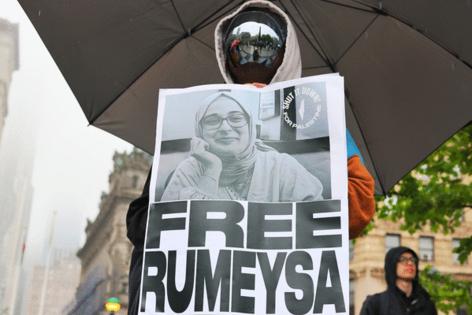Tufts grad student Ozturk is freed on bail in Trump setback
Published in News & Features
A federal judge freed a Turkish graduate student on bail while she fights possible deportation over the Trump administration’s claims of antisemitism in an op-ed she helped write.
The ruling Friday in favor of Tufts University doctoral student Rumeysa Ozturk is the latest setback for the administration, amid a crackdown on foreign students it says are engaging in antisemitic activism over Israel’s war with Hamas in Gaza. The judge released her on her own recognizance and declined to restrict her travel as the U.S. requested.
Ozturk’s detainment “chills the speech of the millions and millions of people in this country who are not citizens” and who fear being “whisked away to a detention center far from their home” if they say something the government disagrees with, U.S. District Judge William Sessions in Vermont said in ruling from the bench.
“I would like to know immediately when she’s released,” the judge told lawyers for the government after he handed down the ruling.
Fight over jurisdiction
Ozturk, who helped write an op-ed supporting Gazans, was arrested on the street by plainclothes officers outside her Massachusetts home in March and quickly moved to an immigration facility in Basile, Louisiana. Her lawyers say it was an attempt to get her case into a jurisdiction friendlier to the administration. A federal appeals court on May 7 ordered U.S. immigration authorities to transfer her to Vermont.
White House press secretary Karoline Leavitt didn’t directly comment on the specifics of the case but reiterated the administration’s view that the courts shouldn’t interfere with U.S. foreign policy.
“We absolutely believe that the president and the Department of Homeland Security are well within their legal rights to deport illegal immigrants,” she told reporters on Friday. “As for visa revocations, the secretary of state has the right to do that as well. It is a privilege, not a right, to come to this country on a visa.”
Deputy Chief of Staff Stephen Miller went further by saying the administration is considering suspending habeas corpus, the constitutional right to challenge detention.
Suspending habeas
“It’s an option we’re actually looking at,” he told the press. “But a lot of it depends on whether the court will do the right thing or not.”
Ozturk testified at the hearing by Zoom from Louisiana. She said that being locked up during her immigration proceedings was undermining her research and exacerbating her asthma, and that federal immigration authorities are violating her constitutional rights.
The government has argued that her activism undermines U.S. foreign policy. She denies that the op-ed she co-wrote is antisemitic. Tufts has said the piece met the university’s guidelines.
Friday brought another legal blow to the Trump administration, as a federal appeals court in Manhattan ruled that immigrant students facing deportation over their speech can challenge their cases in federal court.
Ruling on Mahdawi
The appeals court issued the ruling in the case of Mohsen Mahdawi, a Columbia University student from Palestine who was ordered released from immigration detention by a federal judge in Vermont last month.
The U.S. argued that the Immigration and Nationality Act stripped a federal court’s jurisdiction in the case. The appellate panel said Mahdawi’s removal proceedings could continue while he challenges his arrest and deportation from the U.S. on constitutional grounds.
“Mahdawi’s unlawful-detention claims may be resolved without affecting pending removal proceedings,” the appeals court said. “He asserts that the government arrested him to punish speech with which it disagrees. But doing so would violate the Constitution — quite separate from the removal procedures.”
The Ozturk case is Ozturk v. Hyde, 25-cv-374, US District Court, District of Vermont (Burlington).
_____
(With assistance from Justin Sink.)
_____
©2025 Bloomberg L.P. Visit bloomberg.com. Distributed by Tribune Content Agency, LLC.







Comments